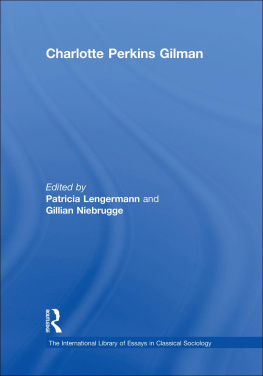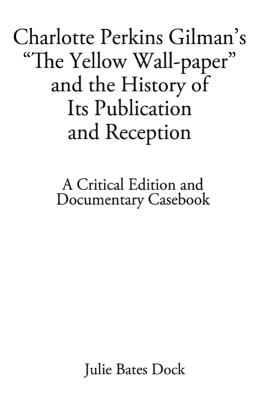Families, Marriages, and Children,
Families, Marriages, and Children
Charlotte Perkins Gilman
Michael R. Hill, editor
First published 2011 by Transaction Publishers
Published 2017 by Routledge
2 Park Square, Milton Park, Abingdon, Oxon OX14 4RN
711 Third Avenue, New York, NY 10017, USA
Routledge is an imprint of the Taylor & Francis Group, an informa business
Copyright 2011 by Taylor & Francis.
All rights reserved. No part of this book may be reprinted or reproduced or utilised in any form or by any electronic, mechanical, or other means, now known or hereafter invented, including photocopying and recording, or in any information storage or retrieval system, without permission in writing from the publishers.
Notice:
Product or corporate names may be trademarks or registered trademarks, and are used only for identification and explanation without intent to infringe.
Library of Congress Catalog Number: 2010015557
Library of Congress Cataloging-in-Publication Data
Gilman, Charlotte Perkins, 1860-1935.
[Selections. 2010]
Families, marriages, and children / Charlotte Perkins Gilman ;
Michael R. Hill, editor.
p. cm.
Includes bibliographical references and index.
ISBN 978-1-4128-1485-0
1. Families. 2. Marriage. 3. Children. 4. Gilman, Charlotte Perkins, 1860-1935. I. Hill, Michael R. II. Title.
HQ518.G55 2010
306.8743dc22
2010015557
ISBN 13: 978-1-4128-1485-0 (hbk)
The editor happily dedicates this volume to Brian Patrick Conway, a perceptive sociologist, dedicated scholar, and convivial colleague.
Contents
Part IV: Children and Parents
It gives me enormous professional pleasure to present this unique collection of Gilmans writings on the sociology of marriages, families, children, and parenting to a wider audience of readers. This work, in its present form, came to life when Giuseppina Cersosimo accepted it for publicationin Italian translationin her sociological series, Esplorazioni (published by Edizioni Kurumuny), where it will soon appear as La sociologia della Famiglia. Matrimoni e figli. I am delighted that Transaction Publications is now bringing forth these analyses for readers in Gilmans native languageEnglish, thus making her insights easily available to new generations of students, scholars, and lay aficionados of perceptive social criticism.
Over the past several years, when designing and teaching sociology courses, I have found that assigning Gilmans shorter writings provides accessible and provocative introductions to numerous social issues that are sometimes thorny and contentious. This is especially true for the complex network of issues surrounding and defining marriage, family, and childrens welfare. Whatever else Gilman does, she gets our attention and she makes us think. Gilman is a catalyst for dialogue, par excellence.
Friends, colleagues, and former students have encouraged me to edit and compile this volume, and for their comradeship I am deeply indebted. Throughout the development and execution of this work, my faith in sociology as a meaningful calling has been validated countless times in interactions with many people, including the intellectually adventurous students in the George Elliott Howard Seminars on Advanced Graduate Research in the Social Sciences, my tutees and professional colleagues in UNLs Hewit Center, my associates at Sociological Origins, every member of the Harriet Martineau Sociological Society, various champions of the ASA Section on the History of Sociology, and our delightful neighbors on Michigans beautiful Mizpah Park Road. Bob Hunderfund masterfully transformed our lakeside cottage as this project unfolded, rescuing our venerable sanctuary in the nick of time. My life-partner, Mary Jo Deegan, makes everything possibleincluding love, space, and time for writing and research. For especially friendly smiles that brighten the long Nebraska winters, thanks always to June and Dave Bilyeu, Tom Carr, Miguel Carranza, Miguel Ceballos, Rollin Davis, Lavon and Bob Dye, Joleen Deats, James Free, Mary Jean Horst, Lori Ratzlaff, Charles Sayward, Sally and Bob Stoddard, and Morrie Tuttle. For salutary input on the present project, I particularly thank Giuseppina Cersosimo, Mary Jo Deegan, Kathleen Johnson, Jan Mach, Ann OHear, Raffaele Rauty, Deborah Ruigh, the convivial folks at Transaction, and the anonymous reviewers of the manuscript. The largest immediate debt, of course, belongs to Charlotte Perkins Gilman. I sincerely hope she would approve.
Michael R. Hill,
Lincoln, Nebraska
Charlotte Perkins Gilman died in 1935, but she remains today a provocative sociological writer; she makes us think, argue, and question our preconceptions, especially with regard to marriage and family. Several posthumous volumes of Gilmans work have been produced and it has been my pleasure to help present three of Gilmans (1997, 2002, 2004) major sociological writings to new generations of readers in English. As noted in the preface, it has been a special honor to acquaint an audience of Italian readers with a selection of her powerful writings on families, marriages, and children.1 The present volume joins a small but growing collection of translations of Gilmans works into Italian. Gilmans classic work, Women and Economics, was early translated into Italian (1902), and is followed recently by translations of The Yellow Wallpaper (1976), Herland (1980), and a collection of tales (2008). An intriguing digital experiment is the new Italian thesaurus edition of Our Androcentric Culture, or The Man-Made World (2008). A recent book-length exposition, in Italian, on Gilmans life and work is provided by Laura Moschini (2006). My goal for Italian readers, in selecting and editing the exemplars in the present volume, was to provide each reader with insightful and often trenchant examples of Gilmans sociological analyses and judgments about one of our most central social institutions: the family. Now, thanks to Transactions Publishers, these lively and insightful selections are also made more readily available to English readers.
Charlotte Perkins Gilman (1860-1935) was a pioneering sociologist, feminist pragmatist, author, and lecturer. She was born in Hartford, Connecticut, and attended the Design College of Providence, Rhode Island. Her sociological education was largely self-taught. Gilman supported herself through writing and lecturing. She was a three-month resident and frequent visitor at Hull-House, Jane Addams sociological settlement in Chicago, during 1895-96. Gilman was an active member of the American Sociological Association and presented papers at professional meetings of the association. One of her major accomplishments was the ability to explain sociological concepts and principles using the media of fiction and non-fiction alike.
Reading Gilman from a Sociological Perspective
Gilman is not always easy to readshe can infuriate, astound, and perplexbut she always engages and often amuses her readers. Writing in an earlier time distinguished by different sensibilities and problems, Gilman brilliantly transcends her era and speaks insightfully to twenty-first-century readers about many lively social issues. Gilmans central strengths are her penetrating sociological analyses of marriage, motherhood, and family relationshipsthe focus of the selections in this volume. Gilmans wit, astute skill as a writer, and forthright language make her work especially accessibleand intriguing. Gilman never hides her conclusions behind sociological jargon, as do many writers today.





